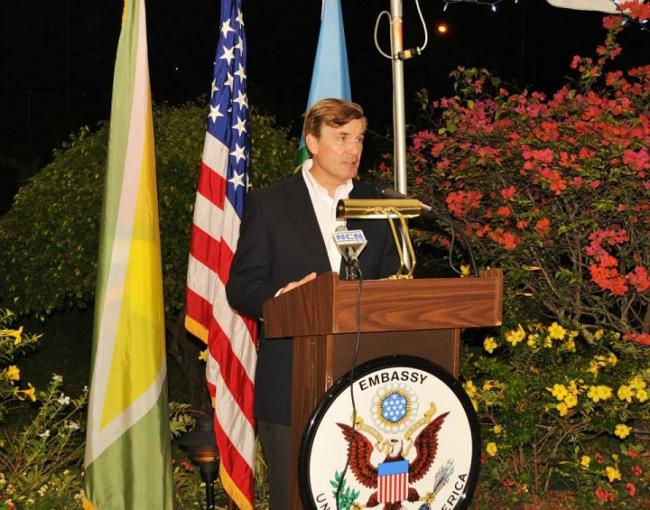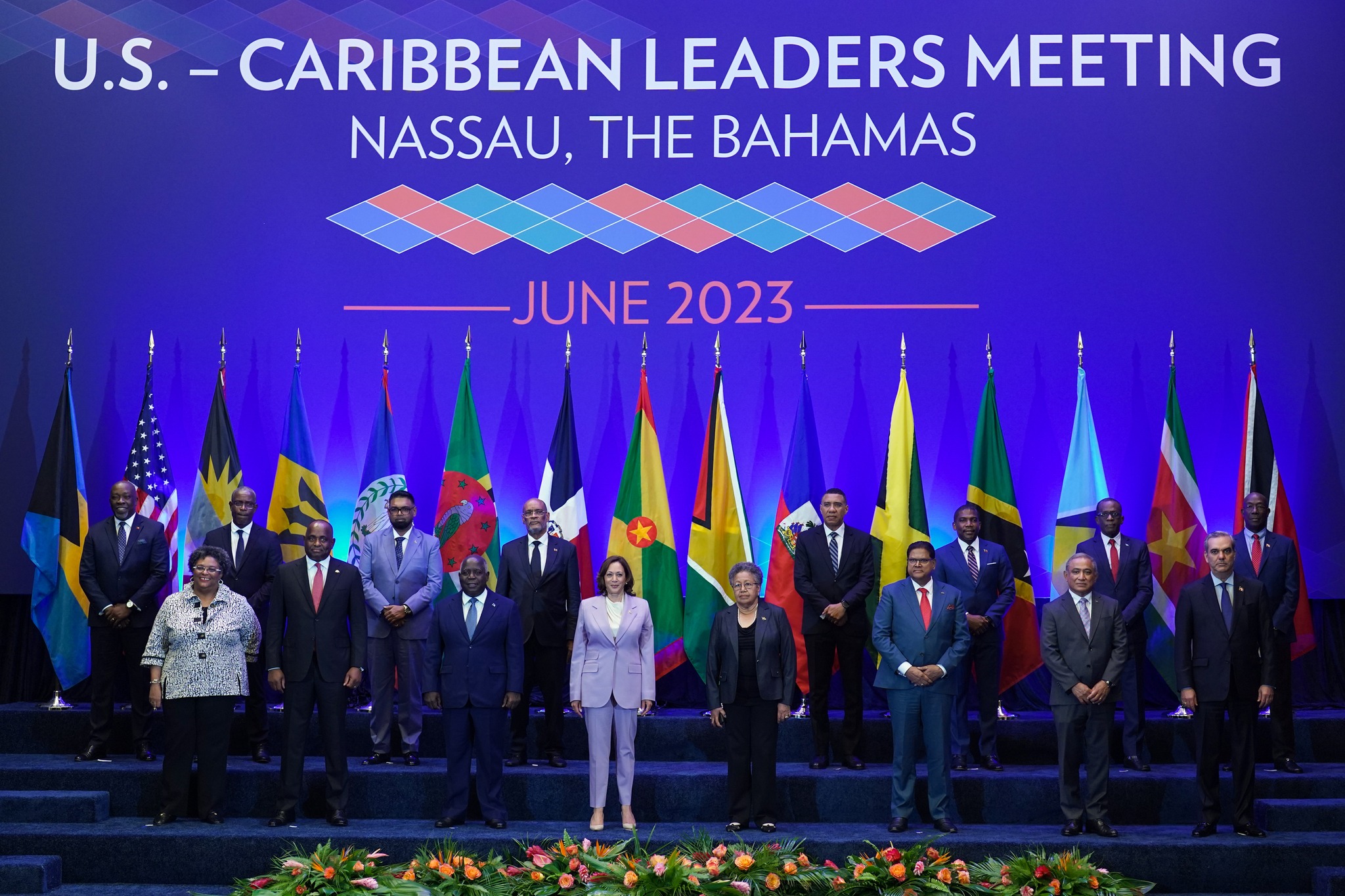
 Wednesday, July 24, 2013, 6:30 pm – Cara Lodge, Quamina Street – USAID Leadership and Democracy (LEAD) project Reception to Welcome Chief of Party
Wednesday, July 24, 2013, 6:30 pm – Cara Lodge, Quamina Street – USAID Leadership and Democracy (LEAD) project Reception to Welcome Chief of Party
Remarks by Ambassador D. Brent Hardt
Good evening. Thank you for joining us this evening to welcome the Chief of Party for USAID’s Leadership and Democracy, or LEAD, project: Mr. Glenn Bradbury.
We are delighted that Glenn now has his feet on the ground in country and is ready to take the reins of our project team in developing and implementing an innovative new program in support of Guyana’s vibrant democracy. The LEAD project will build on USAID’s established track record of constructive and impartial engagement in Guyana to enhance democracy and governance. The program will engage with all actors across the political spectrum in a way that supports the interests of the Guyanese people in effective and responsive democratic institutions.
Specifically, the LEAD program seeks to strengthen the functioning of the National Assembly by encouraging consensus building; working with civil society and the public to boost citizens’ engagement with the National Assembly, and working with all parties to support the legislature’s role as an effective deliberative body. It also seeks to support an ever greater role for women and young people in the democratic system. Upon the completion of local government election bills, whose approval in the National Assembly tomorrow had been eagerly anticipated by people throughout Guyana of every political persuasion, we will also be able to immediately support citizen education efforts in preparation for local government elections and renewed local governance.
I am very excited about this program, and believe that today’s launch could not be more timely. Guyana’s National Assembly is grappling with serious issues. How successfully the parties navigate these issues will help shape the future for the people of Guyana: whether they can once again have effective local governance; whether they will have reliable, environmentally friendly power; what is a fiscally sustainable debt burden; whether the country will be able to deter crime and violence and prevent financial crimes that distort economic development; the strength and effectiveness of the education provided to Guyana’s young people; the broadening of human rights by eliminating discrimination against people on the basis of sexual preference; the development of modern and effective air, sea, and road transportation links, and so much more.
The national elections of 2011, as we all know, created what has come to be known within Guyana as a new dispensation — a minority government and opposition controlled legislature. The United States recognized back in 2011 that this new scenario — in which for the first time in Guyana’s independent history — all parties had a seat at the table and an ability to shape governance, offered hope for a “win-win” scenario for the people of Guyana. But we also recognized that this new configuration would pose many challenges which, if not handled with a spirit of compromise and a focus on the national interest, could lead to stalemate and frustration. That’s why we asked the State Department and USAID in Washington to support a specially tailored democracy and governance program here, to enhance the National Assembly’s functioning and encourage consensus building. We were pleased that USAID shared our view and was willing to support a program to strengthen parliamentary democracy, local governance, and youth and women’s engagement.
Over the past months, we have been meeting with stakeholders from across the political spectrum to help shape the contours of the program, identify priorities, and chart a path toward successful implementation. I would like to thank all who have met with us — from the government and opposition, as well as civil society — many of you who are here today. Your perspectives and feedback have been invaluable as we identify priorities for advancing democracy and strengthening political processes to achieve consensus and constructive political engagement. To people and organizations we have not yet had an opportunity to meet, Glenn and the project team will be reaching out to you over the coming weeks and months as the program sets down its roots.
One of the core messages we heard from all stakeholders and all parties during these consultations has been the critical importance of holding local government elections. After a nineteen-year hiatus, it appears that the National Assembly is poised to approve legislation that will pave the way to elections and a restoration of local governance. Only yesterday, a well-known letter writer commented on the importance of this step, observing: “We want our neighborhoods fixed; we want our communities to have a real say; we want new local young leaders committed to their communities; we want a strong local government system in place to enhance economic, political, and social advancement….” And it was Cheddi Jagan himself who often spoke of the importance of “the empowerment of people at all levels” as critical to Guyana’s democratic development. All parties at all levels have shared with me over the
past year their desire for and commitment to local elections and local governance. I was also pleased to see President Ramotar’s reaffirmation yesterday of the Government’s commitment to approval of the four local government bills and to holing early local government elections. It is my sincere hope that the Parties can come together tomorrow, approve the legislation before the Assembly and pave the way for elections this year. For our part, we stand poised through this USAID program to work with the Guyana Elections Commission and other partners to boost public knowledge of the election process, the role of local government, and the rights and responsibilities of citizens and elected officials.
Having placed a very full plate in front of him, I am delighted to welcome Glenn Bradbury back to Guyana as Chief of Party to guide USAID’s LEAD program. I know that Glenn looks forward to meeting regularly with all stakeholders, and to listening, advising and supporting. Glenn brings to this endeavor a lifetime of service in parliament, party politics, and international development.
He is an expert in governance; parliamentary and committee procedure, legislative analysis and public policy, who has over twenty years of service at the House of Commons of Canada as a Senor Parliamentary Advisor and Senior Policy Advisor to several Members of the Canadian Parliament.
Glenn is also well-versed in providing strategic and crisis communications; issue management; stakeholder engagement, and public affairs. He brings to Guyana in-depth knowledge on the operations of government; political parties; departmental operations; public policy development; and media/public affairs. He has worked on a broad range of legislative, regulatory, and policy initiatives and has drafted successful amendments to legislation and private bills, motions, and statements for presentation in the House and its Standing Committees. He has acted as liaison with representatives of provincial and municipal governments; national stakeholder groups; trade associations; the private sector; NGO’s and civil society organizations; diplomatic missions; and the media.
Glenn served as Legislative Program Director under a USAID-funded program aimed at supporting the Assembly of Kosovo; its legislative committees; MPs from all parties, and advising a 27-member, all-party women’s caucus. While in Kosovo, he was a member of an international monitoring team that observed the first ever, nation-wide Kosovo municipal elections.
Glenn has been actively involved with the Liberal Party of Canada and has participated in a succession of federal, provincial, and municipal election campaigns since 1987.
He looks forward to working with all of you to provide constructive and impartial engagement to strengthen the National Assembly, support successful local government elections, and expand the participation of young people and women in the political process.
Glenn, welcome aboard! The floor is yours.





